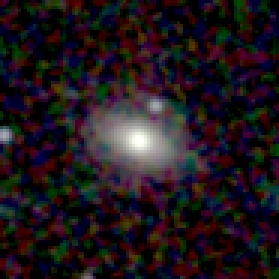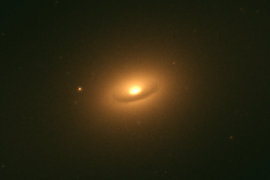Astronomy:NGC 1281
From HandWiki
Short description: Galaxy in the constellation Perseus
| NGC 1281 | |
|---|---|
 A near-infrared image of NGC 1281. | |
| Observation data (J2000 epoch) | |
| Constellation | Perseus |
| Right ascension | 03h 20m 06.1s[1] |
| Declination | 41° 37′ 48″[1] |
| Redshift | 0.014343[1] |
| Helio radial velocity | 4300 km/s[1] |
| Distance | 195.7 ± 3.3 Mly (60 ± 1 Mpc)[2] |
| Group or cluster | Perseus Cluster |
| Apparent magnitude (V) | 14.5[1] |
| Characteristics | |
| Type | E5[1] |
| Mass/Light ratio | 1.7[3] M☉/L☉ |
| Size | ~17,000 ly (5.2 kpc) (estimated)[1] |
| Apparent size (V) | 1.0 x 0.7[1] |
| Half-light radius (physical) | ~4,200 ly (1.3 kpc) (estimated)[3] |
| Other designations | |
| CGCG 540-108, MCG 7-7-67, PGC 12458[1] | |
NGC 1281 is a compact[3] elliptical galaxy[4] located about 200 million light-years away[3] in the constellation Perseus.[5] NGC 1281 was discovered by astronomer John Dreyer on December 12, 1876.[6] It is a member of the Perseus Cluster.[7][6]
Like NGC 1277 and NGC 1271, NGC 1281 is a candidate "relic galaxy".[8]
Supermassive black hole
The supermassive black hole in NGC 1281 has an estimated mass of about 10 billion solar masses (1010 M☉).[3] However, Anna Ferré-Mateu et al. estimated the black hole has a mass of no more than 5 billion solar masses.[8]
See also
Notes
- 1.^ This value was determined by using the given half-light radius.
References
- ↑ 1.0 1.1 1.2 1.3 1.4 1.5 1.6 1.7 "NASA/IPAC Extragalactic Database". Results for NGC 1281. http://nedwww.ipac.caltech.edu/.
- ↑ Yıldırım, Akın; Bosch, Van Den; E, Remco C.; van de Ven, Glenn; Martín-Navarro, Ignacio; Walsh, Jonelle L.; Husemann, Bernd; Gültekin, Kayhan et al. (2017-07-11). "The structural and dynamical properties of compact elliptical galaxies" (in en). Monthly Notices of the Royal Astronomical Society 468 (4): 4216–4245. doi:10.1093/mnras/stx732. ISSN 0035-8711. Bibcode: 2017MNRAS.468.4216Y.
- ↑ 3.0 3.1 3.2 3.3 3.4 Yıldırım, Akın; Bosch, Van Den; E, Remco C.; van de Ven, Glenn; Dutton, Aaron; Läsker, Ronald; Husemann, Bernd; Walsh, Jonelle L. et al. (2016-02-11). "The massive dark halo of the compact early-type galaxy NGC 1281" (in en). Monthly Notices of the Royal Astronomical Society 456 (1): 538–553. doi:10.1093/mnras/stv2665. ISSN 0035-8711. Bibcode: 2016MNRAS.456..538Y.
- ↑ "Your NED Search Results". http://ned.ipac.caltech.edu/cgi-bin/objsearch?objname=NGC+1281&extend=no&hconst=73&omegam=0.27&omegav=0.73&corr_z=1&out_csys=Equatorial&out_equinox=J2000.0&obj_sort=RA+or+Longitude&of=pre_text&zv_breaker=30000.0&list_limit=5&img_stamp=YES.
- ↑ "Revised NGC Data for NGC 1281". http://spider.seds.org/ngc/revngcic.cgi?NGC1281.
- ↑ 6.0 6.1 "New General Catalog Objects: NGC 1250 - 1299" (in en-US). https://cseligman.com/text/atlas/ngc12a.htm#1281.
- ↑ Brunzendorf, J.; Meusinger, H. (October 1, 1999). "The galaxy cluster Abell 426 (Perseus). A catalogue of 660 galaxy positions, isophotal magnitudes and morphological types" (in en). Astronomy and Astrophysics Supplement Series 139 (1): 141–161. doi:10.1051/aas:1999111. ISSN 0365-0138. Bibcode: 1999A&AS..139..141B.
- ↑ 8.0 8.1 Ferré-Mateu, Anna; Mezcua, Mar; Trujillo, Ignacio; Balcells, Marc; Bosch, Remco C. E. van den (2015-07-21). "Massive Relic Galaxies Challenge the Co-Evolution of Super-Massive Black Holes and Their Host Galaxies" (in en). The Astrophysical Journal 808 (1): 79. doi:10.1088/0004-637x/808/1/79. ISSN 1538-4357. Bibcode: 2015ApJ...808...79F. http://stacks.iop.org/0004-637X/808/i=1/a=79?key=crossref.506971355449cb1eaff201ce6de59dab.
External links
- NGC 1281 on WikiSky: DSS2, SDSS, GALEX, IRAS, Hydrogen α, X-Ray, Astrophoto, Sky Map, Articles and images
 |


